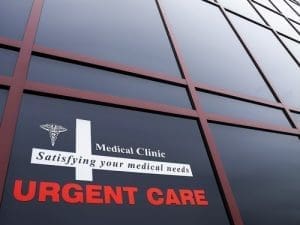 Looking around towns across the U.S., it’s easy to find Urgent Care Centers (UCCs) that have been thriving for a few years, or have just opened, or are now under construction. In this blog, I wanted to share with you our anthropological research on UCCs and some early insights into how they maybe transforming healthcare. As we work with clients on their customer experiences, the fast growth of UCCs is opening up major opportunities to reassess healthcare strategies.
Looking around towns across the U.S., it’s easy to find Urgent Care Centers (UCCs) that have been thriving for a few years, or have just opened, or are now under construction. In this blog, I wanted to share with you our anthropological research on UCCs and some early insights into how they maybe transforming healthcare. As we work with clients on their customer experiences, the fast growth of UCCs is opening up major opportunities to reassess healthcare strategies.
According to the American Academy of Urgent Care Medicine (AAUCM), 9,300 UCCs exist in the U.S. right now – a 14% increase compared to 8,000 in 2008. Not only are their numbers increasing but their businesses are thriving, too, with 83% of UCCs reporting YOY growth, including a 40% increase in patient visits. That’s all based on a recent study by The Urgent Care Association of America (UCAOA), tapping information from more than 300 UCCs.
SAMC Research on Urgent Care Centers
We have been conducting research on Urgent Care Centers and are finding some interesting and I will call “early” trends emerging.  They are based on small sample size and qualitative research we conduct using anthropological methods. But they are popping up everywhere we look. We thought it might be time to start to share these early observations and ask our readers what you see happening.
They are based on small sample size and qualitative research we conduct using anthropological methods. But they are popping up everywhere we look. We thought it might be time to start to share these early observations and ask our readers what you see happening.
Urgent Care Replacing Primary Care or Just “Another Option”
There are many reasons for the popularity of UCCs, but, ironically, one of the initial reasons they were created by healthcare systems might not be panning out as well as expected. That reason was to help drive more revenue to larger healthcare systems by building business for hospital-owned PCPs.
While UCCs drive revenue as stand-alone, mini-medical offices or on-premise extensions of mega retailers, such as CVS Health, Wal-Mart and Walgreens, some very early trends we’re noting show that the average UCC patient may not want a referral to a PCP. Looking at this issue further, it’s important to consider that the majority of UCC patients (63%) already have a PCP, according to the UCAA.
Maybe People Just Want A Quick Fix
In our preliminary observations, none of the 25 people we met had a PCP, falling within the remaining 37% of UCC patients. Just the same, most of them weren’t interested in a PCP referral, either. One older gentleman said that his doctor had retired and for his current cough, the Urgent Care Center was just perfect. Why did he need to find another doctor and have to wait for an appointment? Another younger woman, also with a hacking cough, said she didn’t want or need a doctor — just a pill to kill the cough. I could go on. (Coughs are the most frequent reason people go to urgent care centers.)
This fits with 2013 Vitals.com “Vitals Index” research that found that “34 percent of adults 18-29 do not have a primary care doctor. Compare that to 25 percent of adults aged 30-49 and only 16 percent of adults aged 50 or older.”
Here Are A Few Of The “Trends” I See Developing:
1. Many people told us that their current healthcare needs were already met by a UCC.
If the UCC healed them, they didn’t think it was necessary for a follow-up visit with a PCP. Once the problem was gone, they moved on with their lives and didn’t think that much about healthcare.
2. Approximately 20% of UCC visitors return to their UCC for treatment later,
instead of searching for a PCP, according to a recent Vitals.com study. These patients felt confident in the care they received at the UCC and wanted that experience again. The Vitals.com survey also noted that most participants said the UCC’s quality of service was high — similar to what they would have expected at a PCP.
3. The unparalleled convenience of the UCC.
According to the people we met, the UCC is considered fast and simple, offering an option that’s hassle-free compared to most PCPs or EDs. The UCC is usually in a central location, no appointments are necessary, waiting time is minimal, and patients can get the magic pill or treatment for coughs, colds, sprains, infected cat bites, pink eye or other minor emergencies, so that they can start feeling better.
UCCs may not be the referral vehicle once imagined for PCPs
And some studies show that UCCs might even replace PCPs for some patients. Yet there’s very little concern that UCCs will ultimately replace most PCPs…or will they?
We all know that PCPs handle a much wider variety of cases and conditions than the UCC does and they promote preventative care, which often requires an ongoing relationship with a doctor. Yet, even as I listened to patients discuss their coughs, the doctors were engaging with them to stop their smoking and deal with their health.
I remember well a situation in other research we were doing in Michigan where I listened to a PCP discuss her lifestyle issues with a woman who was overweight and pre-diabetic. While the doctor was doing his job really well, the patient just wanted to get the care she had come in for and leave the office.
On the other side of the coin, some PCPs are taking some lessons from UCCs by becoming much more convenient, extending their hours and generally making themselves more accessible to their patients. While they might argue that UCCs are not the right place for their patients, these patients are choosing options that fit their busy schedules and often their co-pays as well.
What Comes Next?
Perhaps this “poaching of ideas” is the best development to come from the UCCs yet. As they are expanding their access and consumers are choosing their options, traditional delivery systems are going to have to adapt to the challenges of both a new generation — Gen Y’ers — and a new healthcare system — large co-pays.
If UCCs are challenging some PCPs to see, feel and think differently, that will ultimately make the PCPs stronger. The result? Those PCPs that adapt to the new landscape will not only help their businesses and their reputations, but ultimately, they’ll help their patients, as well.
Want to read more? Check out these posts:
“Are Urgent Care Centers Brands Or Commodities?”
“Urgent Care Centers: The Next Big Thing”
To learn more about our work creating branded Urgent Care Center experiences, contact us at info@simonassociates.net or click here:



